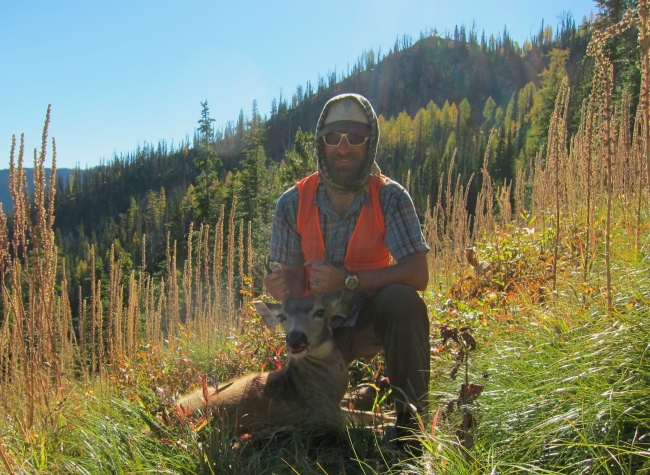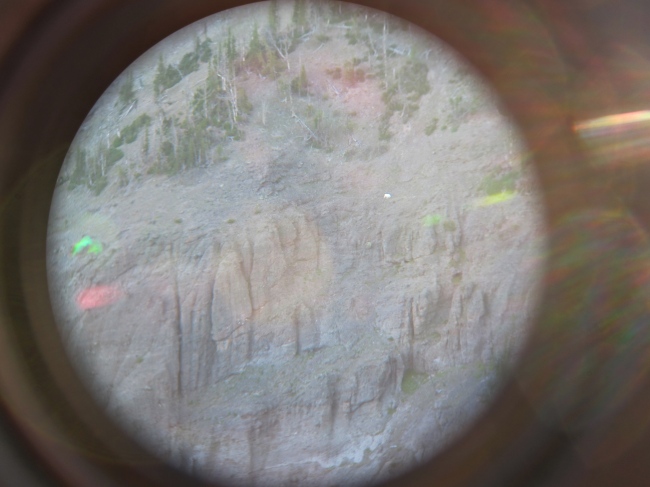Hunting is expensive. Non-resident elk tags in the lower 48 run between 500 and 1300 dollars, when all costs are included. Deer tags are generally a fair bit less. Any other big game species (bear, moose, mountain goat, sheep) is generally quite a bit, or exponentially, more expensive than elk. Sheep tags cost between 1300 and 10,000 or so dollars (the later figure being the mandatory guiding provision in Alaska). These figures are for me shocking, coming from a background of fair-means human powered recreation where the cost of the activity in question is usually (outside National Parks) zero. The only exception is road-accessed wilderness rafting, which I’ve grown to regard as not exactly fair means, and along with backpacking in National Parks provides a decent means of comparison.
 Bob Marshall forky; in 2014 a resident Sportsman’s License (which includes deer, elk, and bear) cost 85 dollars. An 8 mile hike gets you off trail and into deer which only rarely see people.
Bob Marshall forky; in 2014 a resident Sportsman’s License (which includes deer, elk, and bear) cost 85 dollars. An 8 mile hike gets you off trail and into deer which only rarely see people.
Rivers like the Colorado through the Grand Canyon, Selway in Idaho, and Smith in Montana all have permit systems because left unregulated too many people would do the float during prime season, the result being excessive impact on camp sites and wilderness experience. Popular National Parks and National Forests, places like Glacier, Grand Canyon, and most of the Sierra (including Yosemite) demand a quota system for the same reasons as the aforementioned rivers. Most people don’t like having to jump through these hoops, especially when a prime August permit in Glacier or October permit to float the Grand might take years to get. At the same time, I recall no reasonable objections to the spirit or goal of these regulations. No one wants to see abundant poop under rocks in alpine meadows or desert beaches, nor profligate side trails through the precious vegetation in such locations.
Similar things can be said for hunting; any sane hunter wants to be able to spend a day or week out in prime terrain and never see another human, as well as plenty of well-fed critters. If hunting licenses and tags did not exist, or didn’t bring enough restrictions with them, neither of these things would ever be possible. There are just too many people on earth.
 The Spotted Dog Wildlife Management Area, Montana.
The Spotted Dog Wildlife Management Area, Montana.
My quarrel with contemporary river and hunting regulations is that they cost too much money and don’t provide enough opportunity. The cost is of course partly to further limit the number of people who are interested in any given year, and partly to finance the permit system itself. Paying to play on public lands may be a necessary evil, but as the years have passed I find it no less offensive that things like running a given river or hunting a given species requires years, perhaps decades, of planning and waiting. With the way sheep preference points are heading, someone who only starts building points today may never have more than a couple thousands of a percent chance to hunt in a given location. As a country whose wildlife model values access and was specifically founded against the kind of European lands regime which spawned Robin Hood, this is simply unacceptable.
Answer to the river access problem is obvious; shut down the roads. Demolish the Lee’s Ferry road and make everyone carry their stuff down a goat trail from the highway. Close the Magruder road to motorized traffic and cease any maintenance which isn’t human-powered, forever. Give the Salmon River road a similar treatment 10 miles downstream from North Fork. Democracy of opportunity does not mean opportunity of mode, and in this day and this age experiencing true Wilderness should require hard work and sacrifice. Boat-rampers have the Lochsa, Payette, big pieces of the Green and Colorado, and countless others. As a general rule, today we need less access, not more. More opportunity, measured in time and impulse, not less. More quality, in every conceivable respect.
Hunting should be the same way, though the variegated nature of the discipline makes the management issues more nuanced and challenging. Broad guidelines should seek to maximize the range of opportunities available for hunters, as measured by economics and range of opportunities. Tag prices need to go down for non-residents, and for the more esoteric species for everyone. At the same time, to control numbers without requiring more draw-only units, road access needs to be severely curtailed. The Henry Mountains in south-central Utah is managed as a trophy unit for Mule Deer, both in terms of antler size and experience. The odds of drawing a rifle tag there last year were .0007 percent. If you get such a tag you will be mostly alone, and unless you drop dead or go blind you will shoot a big deer. How popular would the unit be if all the roads between 24, 95, 276, and the Notom-Bullfrog were closed to any form of non-human powered travel (including stock)? I think such an approach would go a long ways towards maintaining the integrity of the experience while providing proper opportunity for just about anyone who cared to cultivate the proper skills and fitness.
A few basic ground rules would have to be put into wide application to make such a system work nationwide.
First, close a bunch of dirt roads, as mentioned in the example above. Bomb out culvert, bulldoze in trenches and rocks, enact laws which mandate the confiscation of any ATVs caught where they shouldn’t be. This is the most contentious and most essential step. It will necessarily lead to less pressure and more integral habitat, which will in turn necessarily lead to more robust populations of sensitive species such as mule deer, elk, moose, and sheep. (Whitetails are the rats, or more charitably coyotes, of North American big game. We couldn’t get rid of them if we tried.) Which will lead to more hunter opportunity.
Second, private landowner rights must be significantly reshaped. A good first step would be regulations requiring private holders to provide thru-access to public lands, so this and this will never happen again. Abolishing the ability of landowners to sell ther landowner tags for anything beyond the cost of a standard tag is another step which, frankly, should have taken place 40 years ago. Eventually, the rights of the most extensive landowners to limit public use of their land, including hunting, will need to be curtailed. Perhaps anyone who owns a parcel more than 5,000 acres would have to give out 2 free access permits per 1,000 acres each hunting season. This last is of course a long way off.
It goes without saying that raffle tags, Governor’s tags, and anything of that sort will disappear never to be seen again. State wildlife agency funding will be divorced from tag revenue. Again, how do we live in a country which does this? (Answer; Lehmen Brothers, Goldman Sachs, the demise of Glass-Steagall, etc.)
Third, abolish for-profit guiding on public lands, and any requirement that a non-resident must have a guide to hunt certain species (AK and WY, you should be ashamed). I have no issue with the disabled hiring logistical assistance, but guiding in modern American has come to mean, more than anything, that folks with lots of money can buy their way into better opportunity. If you want to hunt wilderness the only honest way to earn it is with skill and work, things which can be cultivated largely apart from economic opportunity.
 Let the cost of the camera and spotting scope be determined by a truly free market, and the cost of the walk in to and out with a goat be divorced from anything but sweat as far as is possible.
Let the cost of the camera and spotting scope be determined by a truly free market, and the cost of the walk in to and out with a goat be divorced from anything but sweat as far as is possible.
The big picture here, and the reason why so many people find these ideas so offensive, is that American capitalism has for it’s whole life equated monetary success with merit. If you make a lot of money you must be a good person. Good people deserve more hunting (etc) opportunities, ergo tags and hunts which cost a lot are fine, in fact probably a good thing for society. As Abbey said of those engineers staking out the Arches entrance road; this is a powerful and historically weighted argument with centuries of cultural inertia behind it. It is also utterly insane. Anyone who looks at the last twenty years of American history and sees a direct correlation between virtue and affluence, does not see wealth in adulthood as given mostly by historical privilege, who does not in short see many compelling reasons for a 100 percent estate tax on wealth beyond a few hundred thousand dollars (certain businesses excepted), is a fool, a willfully, blind, fool.
Outdoor recreation, including hunting, is as good a metaphor as any for the health of our nation moving towards the twenty-second century. The way we will generate spiritual, intellectual, and economic capital will have everything to do with the things beyond humanity we managed to not screw up, and little to do with GNP and the CPI. Put another way, we’ll finally figure out that happiness is only created by money insofar as basic needs plus 20% are met, and given all the potentially happy things left in this country, hopefully as a culture we won’t figure it out too late.
Leave a reply to DaveC Cancel reply